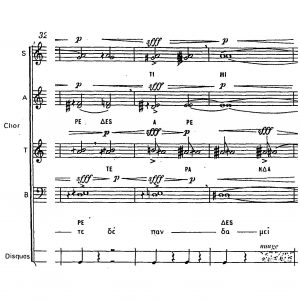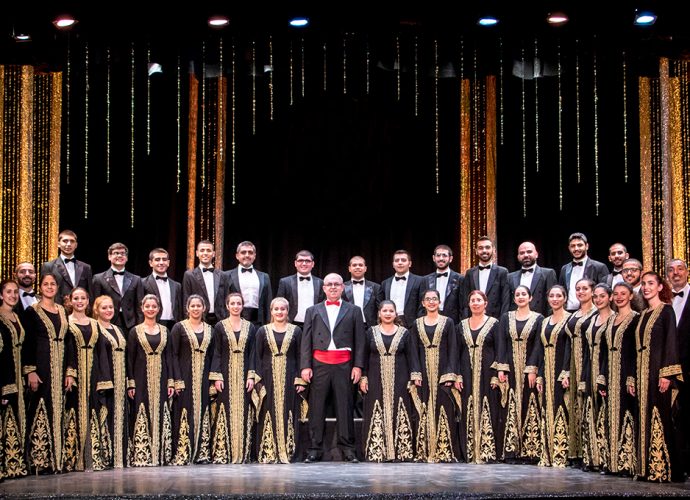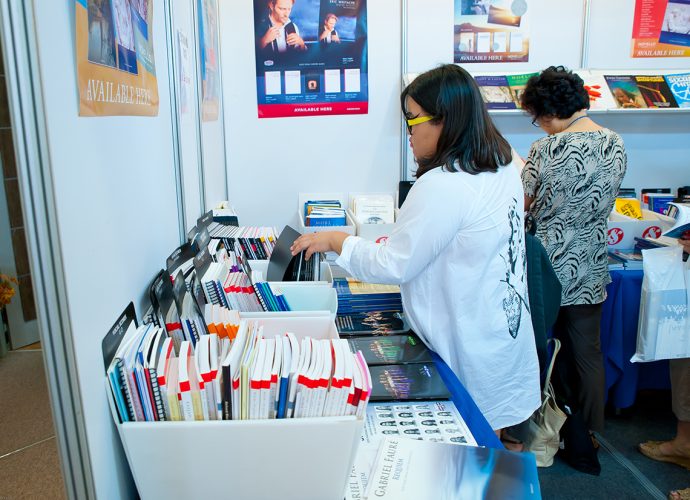Xenakis… (Page 8)
Roland Hayrabedian, choral and orchestra conductor, Marseille, France
As we commemorate the centenary of the birth of Iannis Xenakis in 2022, I have come to realise that I always listen to the composer’s works with joy mixed with serious reflection. As I conduct his music, particularly this year, I wonder why there appears to me to be two sides to the same piece. In fact, in an incredible way, the energy that underpins Xenakis’s vocal music stimulates an ability to feel different somehow after conducting one of his works. It is such that, intoxicated by it, we are transformed by what must be called a musical ritual. In my view, it is energy drawn from Mediterranean sources that gives Xenakis’s music this essential élan vital. For me, its serious side comes from the fact that the dark forces summoned by Xenakis always remind us of battles fought, of future combats, of our human condition that the Cassandras, Pythias, or other divinities – magnificently invented and glorified by the forces of human creativity – dwell on continually.
But where is Xenakis the architect in all of this? Certainly, especially beginning in the 1980s, there are the famous glissandos in his vocal music that, like pencil lines, delineate the abyss. There are the juxtaposed vocal masses that collide, making the text disappear to their own advantage. The singer depends on phonemes whose meanings have little importance at the moment they are pronounced. The words, even if they do have meaning, are only phonemes chosen for the way they sound. They participate in a kind of organised chaos paradoxically constructed from demanding rhythmic values. The difficulty for the musician is great, but he must understand that he is a stone in a building under construction, that his energy will allow the structural elements to reveal themselves, that a piece that is impossible to sing perfectly sometimes – even often – is transcended by the energy expended, the musical (architectural) act being more important than the details. Powerful lines of force composed of a thousand invisible points appear to the listener. The eye has thus become the architect’s ear.
From these masses of sound, created by glissandos, ties, and interspersed sounds, the building appears, constructed by the architect-musician with blows of his sickle in a universe teeming with details. He brings out the key features, seizing the sound in order to denote space. This notion of space – in Nekuia, for example – is produced by means of rhythmic patterns that move the sound from one section of the chorus or orchestra to another, also establishing the dimensions of the echo that defines the space where the musical ritual takes place.

My first contact with Xenakis as a conductor occurred with Oresteia. The myth of the House of Aetrus could not fail to interest the composer, since the chaos it recounts, fuelled by the forces of fate, the violent storm, the tempest in this family line, echoes the tumult of unleashed natural elements of which Xenakis apparently was particularly fond. The roar of the elements: that is what one feels listening to a work by Xenakis, but the musician, Man, is most often found at the very heart of the storm. Of course, in his first works, such as Oresteia – or A Colone [At Colonus] or A Hélène [To Helen] – the text tells a story, motivates the music to a certain extent. In this music, one senses the harshness of the lives of the gods but also that of human life. Yet clemency – as at the end of Oresteia – wins out over vengeance or wrath. It has always seemed to me that in the later works (Serment [Oath], Le Chant des Soleils [Song of the Suns], etc.), Xenakis’s music invites us to find human ideals in the midst of the clamour, to imagine mankind cleansed of all its muck in the great drum of time and the elements. The eye of the storm is the only possible exit.…
No doubt one of the distinctive features of Iannis Xenakis, the man …
Roland Hayrabedian created Musicatreize in 1987. He has conceived more than 300 new works with this ensemble. Hayrabedian has conducted numerous orchestral and vocal groups, including the chorus and orchestra of Radio France, the Orchestre philharmonique de Marseille, and the Nederlands Kamerkoor. In 2022, he conducted Xenakis’s Waarg, Phlegra, and Oresteia in Hamburg, Berlin, and Marseille with the Unitedberlin ensemble. The central focus of Musicatreize is its work with the composers of today, with whom it has formed close relationships, resulting in the creation of many multi-faceted projects.
Translated by Richard Kutner, USA











